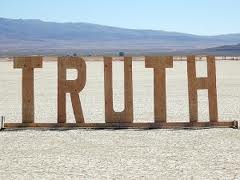
We seek truth in our lives. As human beings we innately know that our search for God includes a search for truth. In this search, our ability to think and speak truthfully says a lot about who we are as persons and how we value integrity.
Truthfulness is important. It is the foundation of embarking on the spiritual journey. We begin with a willingness to confront the truth of our lives, our families, our culture and our world.
A refusal to acknowledge, in ourselves or others, the destruction of addiction, the inability to confront controlling, self-centered behavior or the desire to keep family secrets can all have tragic consequences. A consistent refusal to look at the truth inevitably results in unnecessary pain and suffering.
I have noticed that, as a culture, we are not very truthful. We speak about things in ways that are not true, are not clear or are meant to give the impression of something else.
As the work of Paul Ricoeur demonstrated, language forms how we think and view the world. To be able to see reality clearly, it is critical that we speak about what we experience truthfully and honestly. This means we must take care in how we speak about things.
One of the things we do so frequently that we don’t even notice it anymore, is not using gender inclusive language. Although this is slowly changing. We use “men” when we really mean “women and men,” “human beings” or “humanity.” To insist on using “men” only implies that most humans are men (which is incorrect and untruthful) or that “men” is normative – also incorrect.
Similarly, as last month’s Mary’s Pence letter reminded me, “women’s rights” are actually “human rights.”
Another common occurrence in our culture is the use of violent language. I am often guilty of this. Violent language gives the impression that violence is OK, when it is not. Why not use peaceful language instead? So “bullet points” could easily be “main points” or “key points.” “Target marketing” could be “focused marketing.” You can think of many more examples.
Here’s another example. We shouldn’t speak about “health care reform” when what we are really discussing is “health insurance reform.” The focus should be on health insurance companies, not health care providers. But our untruthful way of speaking clouds this issue.
There are many other ways that we speak untruthfully about things and this makes it difficult for us to see clearly, or to respond in appropriate ways. My husband has an article about this called “The Great Language Barrier Beef” you can read Part 1 here. If you like you can continue reading Part 2 here.
In his classic book, The Four Agreements, Miguel Ruiz maintains that one of the highest virtues we can work toward is to “use impeccable speech” or always speak clearly and truthfully.
“Say what you mean and mean what you say” is wise advice – or as Jesus said, “Let your ‘yes’ mean ‘yes’, and your ‘no’ mean ‘no'” (Matt 5:37). This doesn’t mean that we should speak about things in a way that will intentionally hurt or offend. Rather, we should convey the truth with honesty, love and integrity. We can be truth tellers and truthful speakers.
“Then you shall know the truth and the truth shall set you free” (John 8:32).
You may also like Ugly Truth About School Funding, White Privilege, Violent Language, Violent Thinking, Violent Actions.




